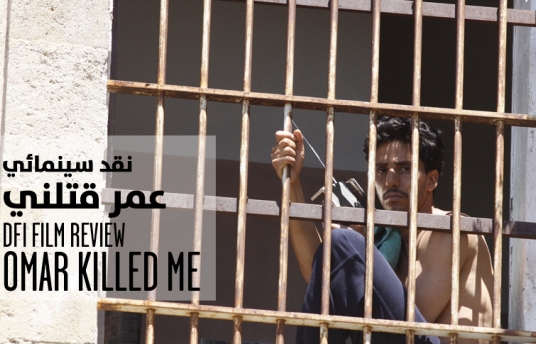DFI Film Review: Omar Killed Me (2011)
Jan 29, 2012

Written by Reem Saleh, New Media, DFI
Film: Omar m’a tuer (Omar Killed Me)
Director: Roschdy Zem
Stars: Sami Bouajila, Denis Podalydès and Maurice Bénichou
Year: 2011
Running Time: 85 mins
On June 24 1991, Ghislaine Marshall, a wealthy widow, is found murdered in the basement of her villa in Mougins, near Nice. An inscription on her door written with her blood reads, “Omar killed me” and automatically directs investigators to Omar Raddad, her Moroccan gardener who barely speaks French and is eventually sentenced to 18 years in prison, despite no evidence.
Based on true events, the case of Omar Raddad outraged the media at the time and questioned the very integrity of the French juridical system against foreigners. Raddad was tried in 1996, partially pardoned by then President Jacques Chirac in 1996 and finally released in 1998. In France, Omar is still considered guilty by the law, and this film, based on his autobiography, might be his last attempt to clear his name.
The film tells two stories; the investigation by writer Pierre-Emmanuel (Denis Podalydès), and Omar’s time in prison. At the same time, we learn of Omar himself, a simple but stoic man, who didn’t go to school, but believes in the honour of his name and that of his family.
As the film demonstrates, there were no traces of blood on his clothes, no indication of his presence at the crime scene. Evidence also points to the fact that he was somewhere else at the time of Marshall’s death. But in a classic case of corruption, Omar is left to fight against a whole system. Results are manipulated, and Marshall’s body is burnt to avoid further investigation. The frustration of his situation pushes Omar to go on food strike in prison – and desperation eventually that leads him to attempt suicide.
Sami Bouajila has an impressive approach to Omar – he doesn’t talk much, but uses his eyes to express his predicament. Consequently, his sparse use of dialogue is all the more effective. “I have no more life, the judge destroyed it,” he cries. The portrayal granted Bouajila the Best Performance Award at the 3rd Doha Tribeca Film festival, alongside a Best Arab Narrative Filmmaker award for director Roschdy Zem.
This is not a film with outstanding cinematic techniques, but presents a story rooted in reality and Omar’s injustice. Zem solicits powerful performances from his cast, without mining the material for pity. The director is an actor himself and this, his second feature, presents the cause of Omar as unfinished business – justice has yet to be delivered.
Similarly, the investigation at the heart of “Omar Killed Me”, even as it sets out to prove his innocence, allows the audience to look for clues, make connections and judge for themselves. We follow the investigation of a police drama which is based on fact and where the judges play devil’s advocate. There is little conflict over Omar’s innocence, but a dawning realisation that those in power are readily able to gather their facts and manipulate them in order to convince those who already suspect Omar of the crime. In the end, the film shines a spotlight on a long forgotten case. One can’t but respect a filmmaker who sets out to try and make a change.
Omar Killed Me - Trailer
إعلان فيلم عمر قتلني